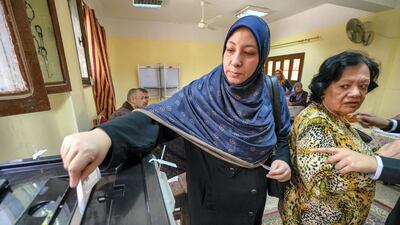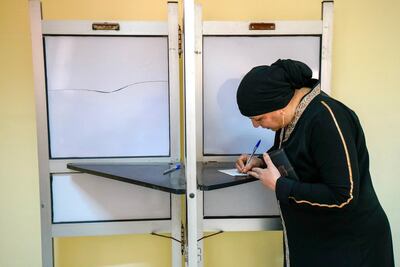As Egypt entered its second day of voting on Tuesday, residents of the middle class Nasr City neighbourhood remarked on the country's transformation from the chaos and conflict of 2013 to an atmosphere of subdued stability, characterising the administration of President Abdel Fatah El Sisi.
In 2013 the Rabba Square traffic interchange at the heart of Nasr city was the site of a bloody confrontation between Egypt's security forces and supporters of the Muslim Brotherhood. Egypt declared a month-long state of emergency after those clashes left over 150 dead, according to the Health Ministry.
“The Brotherhood had taken over [and] this entire neighborhood lived in fear,” said Amira Sayed, a 45-year-old resident of Nasr City who brought her seven-year-old daughter with her to the polling station at Abbas El Akkad Secondary School, just one kilometre west of Rabaa Square. “Now we feel safe on the street and are no longer afraid of letting our daughters walk outside.”
Ms Sayeed took note that there seemed to be more women than men participating in the presidential balloting.
“The state has started applying the law to the harassers and oppressors of women in the streets and the women of Egypt have noticed this,” Ms. Sayed added.

However turnout appeared low on Tuesday and polling officials observed a significant degree of complacency among voters.
The only other candidate on the ballot Moussa Mustafa Moussa registered at the last minute and had announced his support for Mr El Sisi.
With the outcome largely known, the government hopes to boost turnout and show it has popular support. Voting is being held over three days, from Monday to Wednesday, as a way of encouraging participation among Egypt's nearly 60 million eligible voters.
“The participation so far is disappointing,” said Heba Kamel, a judge and resident of Nasr City serving as a polling official. “We are waiting and hoping that people show up tonight and tomorrow.”
More than four thousand citizens are registered at the Abbas El Akkad precinct but the transparent plastic box set to hold up to 750 marked cards was less than twenty per cent filled by Tuesday afternoon, with only about 112 ballots.
_______________
Read more:
In Sisi's old neighbourhood, voters point out the benefits of his first term
Egypt says it deported British journalist for working illegally
Egypt's election begins as Al Sisi seeks second term
_______________
In a nearby office tower on Anwar El Mofty Street, Ezzat Morsi who runs a international shipping logistics firm said he was proud that his wife, sons and daughter joined him in voting to re-elect President Sisi.
“Too many Egyptians are lazy and expect others to take the responsibilities for them,” said Mr Morsi. “But we remember the days when customers were afraid to come here and the Muslim Brotherhood supporters were relieving themselves in the streets.”
Ten kilometers to the east, in the heavily Coptic Christian Shobra district Malak Zakaria, a 47-year-old butcher directly credits Mr Sisi for his own economic survival.
“In 2009 Mubarak used the swine flu scare as an excuse to order the elimination of Egypt’s entire herd of pork,” said Mr Zakaria.
“And there’s no comparison between the terror we felt during Morsi’s rule and the freedom Christians have today with Sisi,” whose administration allowed him and other Coptic butchers to resume selling bacon, ham and ribs from pigs raised in nearby Mokattam, a neighbourhood adjacent to Cairo’s citadel.
Behind Mr Zakaria's shop on Shobra’s Tera’a El Bulacia Street the ballot box at a girls' preparatory school had also been filled to just 20 per cent of its capacity.
"El Sisi is making sure we all live together in peace,” said 21-year-old Sayid Ali Shabaan, a Muslim resident of Shobra who works as a street vendor near the Ramsis Train Station.
“It’s not just that the projects he is working on are big - he has a wide view of Egypt that is about building a future for all of us together.”

Late on Tuesday Mahmoud Al Sherif, the official spokesman of the National Elections Commission lashed out at international media reports suggesting Coptic Christians were the strongest pillar of support for Mr El Sisi. “Reports that Copts are voting in higher numbers than Muslims are complete nonsense.”
But even Mr El Sisi's liberal critics concede that the president successfully sidelined the Muslim Brotherhood as he moves towards his second four year term.
“El Sisi has split the poorest citizens from the Brotherhood by making sure the underprivileged have enough to eat,” said Dr Hussein Gohar, a Cairo gynecologist and international secretary of Egypt’s Social Democratic Party.
“It used to be the Brotherhood distributing food to the underprivileged," said Dr Gohar.
"El Sisi made sure that it’s now trucks operated by the army and other state organisations that sells basics like meat, sugar and cooking oil at reduced prices to the poor."


